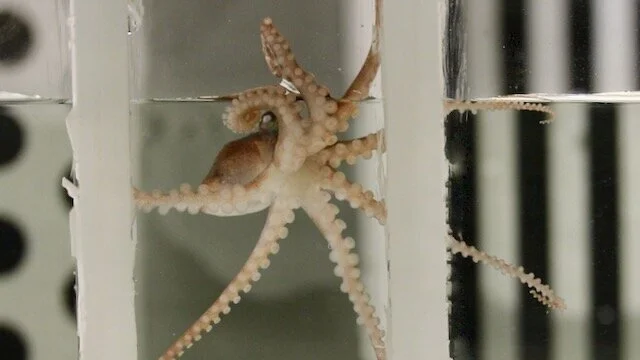A controversial question
****Read our newest work on probable pain experience in octopuses here****
Invertebrate animals are used widely in scientific research, but unlike vertebrate animals, their use is generally loosely regulated. This is based partly on the historical and still prevalent view that invertebrate animals lack sufficient neural complexity to experience pain, distress or other negative affective states when subjected to the same experimental manipulations that might cause pain in mammals or other vertebrates. One of the goals of the lab’s work is to challenge this misconception by producing solid experimental evidence indicating subjective states in cephalopods.
NOCICEPTION OR PAIN?
Pain is an affective state; an emotional response generated by complex central brain circuits in response to sensory input signaling tissue damage. Because pain is a subjective, internal representation, it is challenging to measure and interpret. Nociceptive behavioral responses, such as reflex withdrawal away from a noxious stimulus or whole-body escape movements, are present in nearly all animals with a nervous system, even those with extremely simple brains. The challenge for scientists seeking to identify which animals are capable of the negative affective state of pain (rather than just nociception), is finding ways to distinguish between behaviors that could be generated by simple nociceptive circuits and those that could only be produced if the animal is processing noxious sensory input in neural circuits regulating emotion and affect.
Our experimental work on Cephalopod pain
Whether cephalopods (and other invertebrate animals) can experience the emotional, affective component of pain (i.e., to know that a noxious sensation is unpleasant or distressing, rather than simply responding via unconscious, behavioral reflex), has always been an unresolved question. The newest work from our lab uses a widely validated assay for studying the affective component of pain in laboratory rodents, to show that octopuses behave the same way. The most parsimonious explanation for the behavior of the octopuses in this experiment is that they are capable of the negative affective state that characterizes pain experience in mammals. This is the first conclusive evidence for this capacity in any invertebrate.
Knowing the answer to this question is more than just a scientific curiosity; it is essential to advancing moves to treat cephalopods more humanely in whichever context they encounter humans - in research labs, but also in zoos, aquariums and in fisheries. Without validated assays to measure pain experience in cephalopods, testing which analgesic drugs are effective and at what doses, and what other types of interventions can reduce pain and suffering, becomes exceptionally challenging to do.
We recognize that research work on pain in animals like cephalopods, with their highly complex brains, is controversial. However, the lack of clarity on the question of whether invertebrate animals can suffer as a result of noxious sensory input continues to hamper efforts to improve their welfare. Our goal with this study was to move the question of invertebrate pain beyond reasonable doubt, so that efforts to better regulate their humane use can proceed with a strong evidentiary foundation that until now, has been lacking.
Evidence for vertebrate-like pain experience in invertebrates has been inconsistent, and focused mostly on crustaceans and insects. Some studies supported the hypothesis that the emotional component of pain was present in invertebrates and some did not; there have been very few studies that took validated assays for measuring pain in vertebrate animals and applied them to invertebrates, leaving room for the interpretation that the experimental evidence was insufficient proof of an equivalent emotional state underlying equivalent behavior. In the latest work from our lab, we show that not only can vertebrate specific protocols for testing pain’s presence and absence be adapted to cephalopods, they can reveal the same evidence for internal state.
The work in our laboratory has always focused on asking “how do cephalopods feel their world” and we’ve addressed this question by asking how their nervous system encodes touch and how behaviour changes in response to touch. As interest in cephalopod welfare grows and moves to regulate human interactions with cephalopods proceeds, we can ask now also “how do cephalopods feel about their world?” Our goal is to support evolving regulatory and welfare-focused efforts by providing high quality scientific evidence on which appropriate regulation can be based.



